The North Water
The North Water is See-Saw Films' riveting new drama, written and directed by the acclaimed filmmaker Andrew Haigh
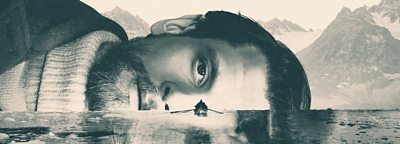
Despite the obvious challenges, shooting in the Arctic seemed the very best option. I wanted us to feel the biting wind, the bitter cold. I wanted to capture that fear that comes from being so far from civilization.”
The series is based on the book by English author and academic Ian McGuire, which was longlisted for the Man Booker Prize. Much of the shoot took place north of the Svalbard Archipelago, the cast and crew working entirely offshore in the Arctic Ocean.
Director Andrew Haigh says: “Ian McGuire’s novel vividly evokes the brutal beauty of the Arctic environment and I knew I had to try and bring a similar realism to the show.
"Despite the obvious challenges, shooting in the Arctic seemed the very best option. I wanted us to feel the biting wind, the bitter cold. I wanted to capture that fear that comes from being so far from civilization.”
Series Synopsis
1859. Patrick Sumner joins The Volunteer as a ship’s surgeon, hoping to lose himself in the tough physicality of an Arctic whaling trip. But the ferocity of the elements is matched by the violence of his crew mates, with Drax, a harpooner, a distinctly brutal force of nature.
As the true purpose of the expedition becomes clear, confrontation between the two men erupts - taking them on a journey far from solid ground and way beyond the safe moorings of civilisation.
Cast and Crew credits
Cast
Patrick Sumner…………………………………………..………………………….Jack O’Connell
Henry Drax………………………………………………………………………………Colin Farrell
Captain Brownlee………………………………………………………………....Stephen Graham
Baxter…………………………………………………………………………..Sir Tom Courtenay
Cavendish……………………………………………………………………………….Sam Spruell
Otto……………………………………………………………………………………Roland Møller
Priest…………………………………………………………………………………….Peter Mullan
McKendrick…………………………………………………………………….Philip Hill-Pearson
Jones………………………………………………………………………………...Kieran Urquhart
Corbyn………………………………………………………………………………….Jonathan Aris
Joseph Hannah…………………………………………………………………..Stephen McMillan
Hester………………………………………………………………………………..………….Hester
Anna…………………………………………………………………………………..….Nive Nielson
Elder Inuk……………………………………………………………………...…….Natar Ungalaaq
Younger Inuk……………………………………………………………………..……….Jerry Laisa
Urgang………………………………………………………………………………Ipeelie Ootoova
Merok…………………………………………………………………………….Keenan Carpenter
Crew
Writer and Director…………………………………………………………………Andrew Haigh
Producer…………………………………………………………………..…………….Kate Ogborn
Executive Producer, See-Saw Films…………………………………………………Iain Canning
Executive Producer, See-Saw Films…………………………………………...…Emile Sherman
Executive Producer………………………………………………………………Jamie Laurenson
Executive Producer………………………………………………………………..Hakan Kousetta
Executive Producer…………………………………………………………...………Niv Finchman
Production Designer…………………………………………….…………. Emmanuel Fréchette
Costume Designer……………………………………………………………….Sarah Blenkinsop
Hair and Make-up Designer…………………………………………...….Karen Hartley Thomas
Editor……………………………………………………………………..………..Jonathan Alberts
Editor…………………………………………………………………..………..Matthew Hannam
Character Biographies
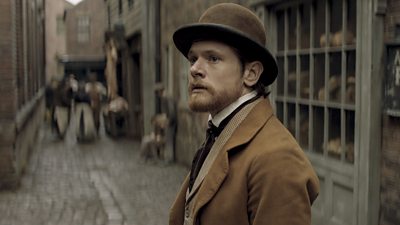
Patrick Sumner (Jack O’Connell)
Patrick Sumner is appointed ship’s doctor on board The Volunteer, a whaling ship sailing from Hull, bound for the North Water. He has recently returned from India, where he worked as an army surgeon, but keeps the bitter secret of his court-martial close to his chest. He’s also brought home a thriving laudanum addiction.
Keen to occupy his days and to claw back some semblance of dignity and purpose, he impulsively takes the job aboard the ship. Little does he know of the true nature of this expedition.
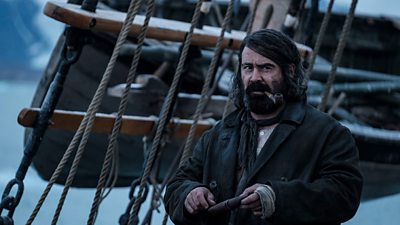
Henry Drax (Colin Farrell)
Drax is a harpooner, one of the best there is. He can kill a whale with machine-like efficiency and balletic grace. Some say he’s a heathen, more animal than man, but the way he sees it, he is simply driven by instinct. Pragmatic, physically imposing and devoid of empathy, Drax is a man who exists to sate the urges he feels. Morality or decency matter little to him. But when these desires get him into trouble on board The Volunteer, he has to fight for his own survival.
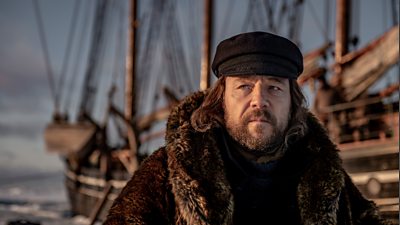
Captain Brownlee (Stephen Graham)
Brownlee is a whaling man through and through. He knows how to captain a ship through the perilous Arctic waters, how to slaughter the whales until the sea turns red, and how to fill the hold with their blubber. The trouble is, the whales are running out. The whaling industry has driven them close to extinction. And while Brownlee is loyal to his ship and his motley crew, his loyalty is first and foremost to himself. So when the ship’s owner, Baxter, proposes a dangerous but lucrative alternative plan for The Volunteer, Brownlee decides to silence his conscience and follow the money.
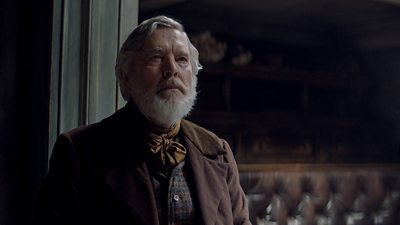
Baxter (Tom Courtenay)
Baxter is the owner of a fleet of whaling ships, including The Volunteer. He pays men handsomely for their loyalty to him, but he himself has no loyalty to anything other than money. He is smart enough to know that the whaling trade is over, and he wants to cash out while he still can. If that means risking the lives of an entire crew of men, then so be it. Whaling is a dangerous game. The only danger he failed to predict was that of the tenacious Patrick Sumner.
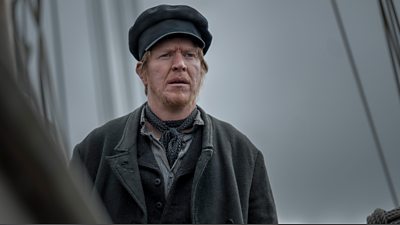
Cavendish (Sam Spruell)
Cavendish is the First Mate aboard The Volunteer, employed by Baxter because he does what he’s told and doesn’t show the kind of initiative that might derail Baxter’s plans.
He possesses a virtuoso knowledge of the local whorehouse and is more comfortable using his fists than his words to resolve an argument. He was born with sea legs, and once on board, Cavendish is in his element. But when the ship arrives in the North Water, events quickly spiral out of control. Suddenly Cavendish is catapulted into authority and called upon to take charge of the crew. Does he have what it takes to get his men back to safety?
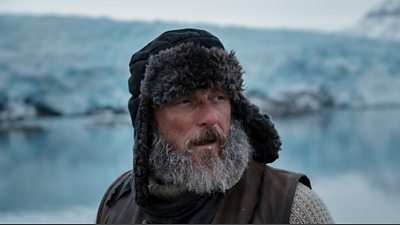
Otto (Roland Møller)
Otto is a Danish harpooner. He’s a man built like a mountain who can toss a harpoon 50 yards without making a sound. But, despite his profession and physical appearance, he’s a deep thinker with a speculative and mystic bent. Once on board the ship, he bonds with Sumner, who takes his spiritual wanderings as part of his eccentricity. Until, one day, Otto shares a chilling premonition about the grisly fate of the crew. This is harder to ignore.
Interview with Jack O’Connell
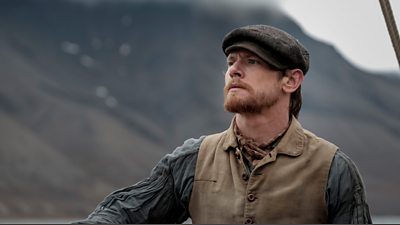
Jack O'Connell plays Patrick Sumner
Who is Patrick Sumner?
He’s quite enigmatic. He was discharged from the Army under quite questionable circumstances. Was it necessarily all his wrongdoing? Did he deserve his discharge? Did he deserve to have his career completely upended? By the end of it, he's a man trying to find his balance, and the more the story unfolds the more he is met with the realisation and reality that there’s a little of what Drax represents within Sumner as well. I think that’s part of what Sumner has spent the majority of his life prior to this running away from.
What attracted you to the show?
Andrew Haigh is a great director, one of the best. That was very appealing. I learned that Colin Farrell was going to be included, which was again very appealing. The cast started to look amazing the more we went on. And of course, there was the opportunity to go to the North Pole, or a little south of it, was a once-in-a-lifetime feeling.
What attracted you to the role?
The character offered me a chance to do something that I haven’t really found much opportunity to work within before, in terms of who he is and where he regards himself in society. On the superficial basis, I’ve never played anyone within the medical profession before, and the idea of an ex-Irish patriot, an immigrant, coming into the world with all these complexities, as I understood it, gave him a sense of an imposter syndrome. That’s how I began to understand him.
How was filming in the Arctic?
We knew that it was going to be dangerous. There’s no way of completely eradicating danger. We had no signal, no internet. Everyone subscribed to it because of the personal challenges. We took an old-school sailing ship which had an engine but could also double as our mid-19th century whaling vessel, so we were very lucky to be able to do that, because we were pretty exposed to all the elements of that environment.
When we got on board our set, which was this old-school ship, the Activ, which we called the Volunteer, that was great, just to get on it and get an idea of what it was like to live on there. Colin sailed on her overnight, so we were all picking his brains to figure that out. We were all up for it, but I think the captain just wanted to be friends with Colin over all of us. That’s fair enough, isn’t it? He’s a cool guy!
So yes, we were all picking his brains and trying to imagine being on there for over a year.
How was the atmosphere on set?
It was a tight space, so any negativity would have been potentially contagious. We were all very fortunate that we were with each other, and fortunate with the crew on board the Activ, who were totally professional and knew what they were doing. We could watch them and sometimes we had to pretend to be like them on camera, and they were really good, really welcoming. Also, they were interested in what we were there to do, so there was this sort of trade-off between interests and all of that.
What were your highlights?
The highlights must be when we encountered wildlife in its natural form. Seeing polar bears cutting about. One night a polar bear came right up to the ship. It was three in the morning and we all had to be up at seven. I’ll quote Colin. He was up watching this bear and a couple of us were on the stern, and he said: “Look man, you can’t go to bed while this is happening.” The chances are we’ll never experience that again.
Interview with Colin Farrell
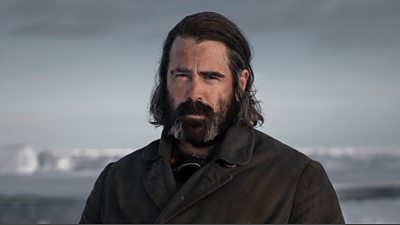
Colin Farrell plays Henry Drax
Who is Henry Drax?
The character of Drax in the novel and the script is incredibly intense to read and to play, in a joyful way, but he doesn’t consider himself to be intense at all. He’s just following his proclivities day to day, moment to moment, breath to breath.
He’s been a harpooner probably for the majority of his life - not that it’s ever specified - since childhood, or maybe just before or at the onset of his adolescence, that was probably when he first found himself on a ship as a cabin boy. All this is never talked about, but I imagine that he worked his way up from being a cabin boy to being a hand to a harpooner, and I think that he finds a sense of purpose and a sense of meaning in life when he’s on the water, when he’s involved in the hunt, which more often than not culminates in the kill for him, because he’s very adept at what he does.
What attracted you to the role?
It feels like a very honest character, albeit one raised in cruelty, and thereby exists in a world where he acknowledges the cruelty all around him and doesn’t even see it as cruelty, just that there is a natural order to things. He would be, without declaration of it, Darwinian, someone who believes in the survival of the fittest and of that being the natural order by which the world exists. More than any character that I’ve ever played he is a character that lives without compunction. He has no apology for anything that he says, does or feels. It’s an extraordinary character to have the opportunity to play.
What attracted you to the show?
We had it stacked in our favour - everywhere you looked there was incredible skill. Wardrobe, the make-up department, the people who helped us as, a cast, to create this world and to create our individual characters, extraordinary set design and set decoration as well, those who create the world in which we inhabit. It’s an incredible tapestry of detail, otherworldly detail, something so foreign to me.
There have not been very many films and stories that take place around the whaling industry. Out of interest and curiosity and fun, I looked around, and for such a dramatic moment in the history of man, pre-Industrial Revolution, there are not that many stories, so it was wonderful to be immersed in this world that was so exotic, so brutal and so different.
How was filming in the Arctic?
I did feel that death was just around the corner at any given time, that we were just one mistake away from someone falling into the Arctic sea and either very quickly getting hypothermia or sinking under the weight of the waterlogged costume. There were also polar bears around, who were beautiful and elegant and majestic but also apex predators. It was a very profound experience for us all to share.
None of us had been up to that part of the world before, we were all seeing it with child’s eyes. We all went through whatever we went through individually, missing our children, our lovers, our wives or husbands, because we had no communication, no email… it’s only three or four weeks but three or four weeks in a world in which we’re so used to having such accessibility at our fingertips. I found it really hard not to be able to be in contact with my guys, but it certainly created a bond between us all.
How was working with Andrew Haigh?
I experienced from him this incredible sense of ease, incredible commitment to the material and to pushing away any aspect of artifice to get to the truth, or what Andrew perceives through Ian McGuire’s source material to be the truth, to what Ian was angling towards.
Andrew was insistent that we went up to Svalbard. Usually they would shoot this film in a tank. You might go out on to the Irish Sea, or maybe off the coast of England or Scotland, a little bit towards the North Sea, and you’d do a week or two out there and get grand vistas, but Andrew insisted that we went up there, up to the 82nd parallel.
He is really specific, really particular, but wants you to play, is not oppressive in how he directs, does not want to control any of the actors, very supportive, very inclusive of everyone, the whole crew, and not beyond listening to the opinion of anyone with anything to say, no matter what department they are in.
What were your highlights?
Going where we went to initiate the process of telling the story, the first four weeks up there, and hanging out with the crew of the Activ, the ship that is the whaling ship, the Volunteer, in the piece. Hanging out with Jonas, the captain of the Activ, and his crew, Guillaume, Andreas, and Martin, all of them, they were extraordinary. You pick up things by symbiosis, by being close.
And the environment did so much, it instantly created a sense of tension and pressure. Your body, physiologically, is responding in a way and with an aggression that my body has never responded to the environment with before, because it’s never been in an environment like that. Even that, instantly, whether you like it or not, removes you from what is familiar in your reality, my reality.
There wasn’t much room for rehearsal, but we had a little time to get familiar with boats and rowing. We had this collective communal experience, and then each of us had our own individual profound experience of being up in that beautiful, hostile part of the world.
What was the atmosphere on set?
If you’re doing a piece that feels as much like a collective as this does, where there is really no hierarchy, then, as has been said before, I have never it felt more relevant than with this job that 'there are no small parts'. There aren’t small parts, there are parts with one line and parts with 1,000 lines, but each element in this, each person who has a line or is floating around in the background is so important. The idea that we would all be as engaged in the story was really important, for Andrew, for all of us, because of the shared experience that we had in this remote part of the world for four weeks.
Did you do the polar plunge?
I’d like to deny that I ever did it, but lovely Roland then decided to put it on his Instagram. That was lovely, one of those rites-of-passage things, the polar dip. God, it was cold, to state the obvious, a dip in the Arctic ocean, it was terrifying. I only went in the once, but I think Jack O’ Connell went in a couple of times. He got the bit in his teeth. I was in and out fast. It was cold.
Interview with Stephen Graham
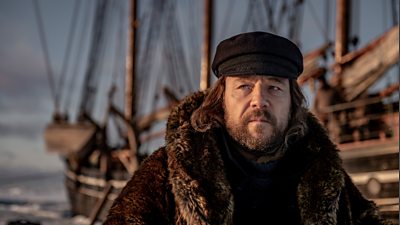
Stephen Graham plays Captain Brownlee
What is The North Water about?
The North Water follows a young man, Sumner, a surgeon, and it’s his journey, slightly rites of passage, but also trying to find himself and what he is running from; him facing his fears and the ghosts of his pasts and also seeing where he fits into this new world. It’s a very dark piece, which is partly why I was attracted to it.
It’s also the end of an era in many respects, that new age of machinery and steam engines that are about to take over from the manual labour of what it was like back in those days to be a whaler. Every character has a different motivation or intention. They’ve each got their own thing going on, which is great. That’s where the complexities of the writing come in, which feed through from the book.
Who is Captain Brownlee?
He’s a man of integrity. He’s a whaler by trade, it’s in his blood. The character we created was that his dad was a whaler so he was always going to be a whaler. He always wanted to captain a ship and he did, and his first ship set sail and sank, so after not doing it for a while he comes back to captain The Voyager.
What attracted you to the show?
I thought that the script was fantastic, the character was great. I’d watched Andrew’s work and thought he was a wonderful director. Colin’s fantastic, he’s a wonderful actor. I’ve always admired and looked up to him. And Jack O’Connell, who I’ve known from when he first started on This is England. I’ve watched his career flourish, he’s a marvellous actor, so those two alone, and obviously Sam, who is a brilliant actor.
How did you prepare for the role?
I did a lot of research about the period and about the men of the time, read some poems by whalers, had a look through the history books and the archives. Obviously, we’ve got the internet these days, so you can find anything out, and I did quite a bit of research on the man and what he’s about.
How was working with Andrew Haigh?
He has a lovely atmosphere on set, his sensibilities, allowing us to create stuff and really finding the moments. He’s got time for everyone, he’ll have a little word in everyone’s ear and guide and steer us, he’s a joy to work with. Andrew has done an amazing job, all these completely rounded characters, yet every single one with something different going on in every scene.
How was filming in the Arctic?
They said, “three weeks filming in the Arctic”, and I was like, “well, not really the Arctic, not the Arctic Arctic?” but they said: “It’s three weeks in the Arctic on a ship, sailing”. We ended up 22 miles away from the North Pole. We pulled into this massive glacier and there was this feeling of being on another planet. It was unbelievable. We saw polar bears, walruses, seals, all these beautiful creatures in their own habitat, that was amazing.
You immediately form bonds and relationships because it is so intense. Obviously, everyone likes to have time to themselves, go back to the cabin, where the lads played a lot of chess. We played a good few games of Uno, we’d sit and have little chats, it was nice, there was a real feeling of solidarity, which in certain aspects would overspill on to the screen.
What were your highlights?
There’s one bit where Brownlee is going across to another ship, and I’ve got this great, massive fur coat, with my hat and gloves on, and obviously the big wig. They are rowing me across to this boat and I’m out in the open water, and all the ice, the glaciers are right there, and the lads are throwing out the oars and it was one of those moments where you just think. what’s going on? What am I doing?
Another amazing thing was that we did a first take, then a second take, the lads are rowing out, I’m there being Brownlee, all serious, then all of a sudden, a massive bit of ice just fell, and you can see it falling. I was looking at it and thinking, oh my God. Then it hits the water and I’m thinking, I hope that they’ve got this on film as well... The lads are rowing, then you heard shouting and we had to stop, all of sudden, because there’s a massive wave is on its way to us in this little boat, and I’m thinking, I’m going to die in the middle of the Arctic in a fake fur coat! The lads are paddling as fast as they can to get away from it, and everyone’s a bit worried and a bit panicked, and we just missed it, but it was high. The whole experience was unbelievable.
How was the polar plunge?
Being honest with you, it is the most exhilarating thing I have ever done in my life, and I have done skydiving, I’ve snorkel dived really deep, seen some magical things, but that was absolutely unbelievable. There was nothing like the feeling. It was great because quite a few of us did it together. A few wimped out but most of us did it, and believe it or not, there was a massive jacuzzi on the boat, and it was boiling hot, so we ended up with almost third-degree burns after jumping in there and then going into a big hot jacuzzi, but it was great, a really lovely experience. I never thought I’d get to do something like that.
Interview with Tom Courtenay
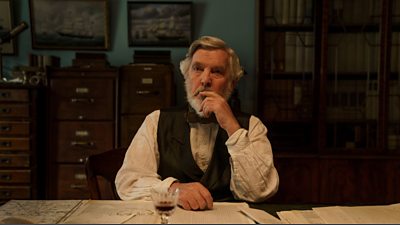
What is The North Water about?
The story is set in Hull in the North of England - which happens to now be my hometown - in the late 1850s. It’s near the end of the decline of the whaling industry and it’s very nice for me to be speaking with my native (regional) accent as a Hull ship owner called Baxter, who feels that the bottom’s fallen out of whaling and so he wants to devise another way of making money.
Why does the book The North Water lend itself well to a TV adaptation?
I saw someone describe the book as Dickensian - it’s got a lot of very rich characters. It’s dark, but it’s also literature. And the language in the piece is good language. I’ve been mostly a theatre actor in my career and it’s lovely to have that kind of dialogue to speak on screen.
Why were you attracted to playing this role?
It’s kind of fun to play something that is the complete opposite of me. Somebody very sure of himself, who has money and I suppose enjoys the power that it brings. Despite being somebody who is not at all like myself, I did find it helpful to use the Hull accent, because I was brought up near the fish dock there. Now the fishing industry in Hull is deceased, and of course they weren’t fishing for whales then, they were fishing for Garden Haddock. I think the Hull accent does help me with that feeling of getting into the character of Baxter.
How are you able to relate to your character?
I don’t know that I can relate to the character of Baxter. There’s a sort of northern thing of saying things as they are, which I do have a feeling for. But, I could never be as brutal as he is, so it was quite fun to pretend to be ruthless.
How do you prepare for new roles?
We were on holiday in Whitby [a northern seaside town in Yorkshire] and I went to the whaling Museum there and was shown the harpoon guns from the era, which my character complains about because the guns meant that there were less whales to catch. I was told that the harpooners didn’t like to use guns because they prided themselves on their strength. The harpoon a massive thing to wield - you’d have to be strong.
What’s it like working with Andrew Haigh?
Well, Andrew sent me The North Water, and I said, “Andrew, how could you possibly imagine I that I could play such an awful person?” and he said, “Oh, we’ve all got madness in us”. But I did 45 Years with him and it was a big thing for me. I’ve never been so excited to get a screenplay like that out of the blue and it was lovely to be with him again. I thought his film Lean On Pete was wonderful - I’m a great admirer of him. He’s got a very light touch and very jokey, but I think he’s gifted and he’s certainly done a wonderful screenplay from the book.
How do you think that the audience may respond?
I hope audiences will relish the characters. The young surgeon has to discover himself, and then there’s the essence of evil that’s played by Colin Farrell. He’s an extremely un-evil person, having met him.
What is your favourite scene in The North Water?
I’m just happy to be in it and working with good people. And at my age, what fun.
Interview with Sam Spruell
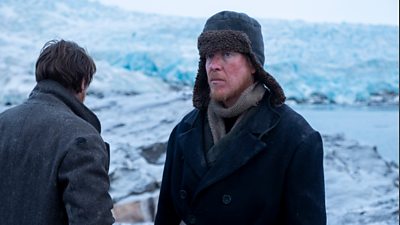
Sam Spruell plays Cavendish
Tell us about your character Cavendish.
I play Michael Cavendish who is the first mate of the ship. He, like a lot of the guys in the series is an alpha male, but actually Andrew and the story of The North Water seem to be more interested in things about these men that aren’t alpha - the more emotional side of these characters or the more obvious psychological flaws in their armour, so to speak. I love my character actually. I think Cavendish is funny and optimistic, but he’s also cruel and self-centred. One thing about him that seems very clear is that he really wants the character Henry Drax to be his best friend.
How did you prepare for this role?
For the most part, I prepared through quite a lot of reading. Andrew Haigh sent out a brilliant pack of stuff: a reading list, music to listen to, images, a whole series of things to read about whaling ships themselves and all the tools on board, how life would’ve been, where people went to the toilet, what they ate, how they washed or not, the different levels of the hierarchy at play on a whaling ship. A lot of the stuff which was useful in preparing for the role and series came really from talking to sailors. We were working with and shooting on a boat that was used in the show, and with that boat came the people who knew how to sail on it.
How are you able to relate to your character?
I really relate to his affection toward Drax. I think as a younger man or boy, I remember wanting to get to know the cool lads in my class who weren’t interested in knowing me. I think my character really admires Drax. He has that sort of manliness and that direct action; he’s able to execute that direct action that Cavendish would love to be able to do but he can’t. I don’t think he has the ability to marshal either himself or other people to make things happen.
Tell us about what it’s like to film in the Arctic.
Just going out to the Arctic in itself felt like a complete rarity. I think the technical difficulty of finding ice to film on, and then when you do find that ice, that ice staying long enough for you to finish your set-ups for the day without it breaking apart in two - which did happen actually.
What was the working environment like?
We were on a ship for three and a half weeks together. There’s nowhere else to go really besides the observation deck or your cabin, so, it was very close quarters. I think everyone wanted to make sure to treat people well and make sure everyone was alright to ensure this epic project was a success. I actually loved the isolation of it. There were no phones, no Wi-Fi, so we were actually quite focused on the work, which I thought was great and it felt quite good to think about stuff without the distractions of everything that is modern life.
What’s it like working with Andrew Haigh?
I really, really enjoyed working with Andrew. I think you can have a good chat with him, not necessarily about work, but usually about work. He’s very open. He’s very sensitive to the nuances in human behaviour, which is what you need to be to be a good director. I think he’s also written an ensemble piece and he’s been really keen to, even with small characters, to make sure that they’re featured and to create a full dynamic, interesting world. You can only do that by bringing everyone on board, by getting everyone to commit to that. I think he’s really good at selling his aspirations for the film or for individual scenes or shots or whatever and getting everyone on board. That’s the mark of a good leader and a good communicator.
What are some of the production values that made a difference on set?
What sets The North Water apart is the raw experience you get from shooting in the Arctic, I think it’s just really special. All the scenes have a sort of theatrical quality to them, they are almost literary without being pretentious. The North Water is a different type of period piece as it’s about working-class people who, I guess, have a poetry about them. I don’t think we see that enough and I think that’s really exciting. For me, a really great experience has been a lot of my scenes with Colin. It’s been pretty magical working with him, not just because he works really hard and prepares fully, but he’s generous and he wants to be challenged in the scene and outside of it as well so that we can find something magical.
What was the Polar Plunge?
There was a point where we all jumped in the water in our boxer shorts, which obviously was awesome and totally terrifying because it was so bloody cold. To know that you’ve accomplished a shoot in that environment felt unique and special, and to remember your lines at minus 25 feels pretty satisfying.
Interview with Peter Mullan
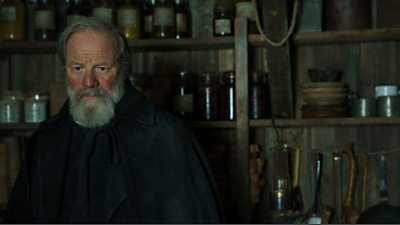
Peter Mullan plays the Priest
What is the role of the Priest in the North Water?
Well, the audience is introduced to my character, who lives in this cabin with Anna, but not in the romantic sense as he is a priest after all, she instead looks after him. He lives here and he works to define Sumner, played by Jack.
What attracted you to this role?
I loved the script, it’s as simple as that. I got the script, I really liked it and I liked the idea of going to the North Pole. And then, obviously, Colin was doing it and that was a big plus for me, and Stephen and Jack because I know all of these guys. I’ve worked with them before - they’re all beautiful. Then of course Sir Tom Courtenay, who is one of my heroes.
Tell us about working with Jack O’Connell.
Jack’s a sweetheart. We have a really nice time. We have a good laugh. And then, when we turn over we do all of that serious stuff.
Tell us about why Andrew Haigh was essential to this project.
Andrew creates a beautiful atmosphere on a set. With any good atmosphere on a set, the director should take 99 percent of the blame and 99 percent of the credit, when it’s due. And Andrew should get that 99 percent credit because he created a lovely, ensemble feel, where everybody is equal and welcome to contribute. There’s no shouting, no balling, no hierarchy. He’s got a lovely ease and very confident with materials so he could change little bits here and there. But really it’s been a joy, I have to say.
Interview with Writer and Director, Andrew Haigh
Why did you want to be a part of adapting and creating The North Water?
I was working on another project when See-Saw sent me the book. On reading the first 20 pages, I thought, I want to do this, I have to do this. There was something incredibly special about it in that it’s a historical drama, a thriller, but really it seems to say something very important about the nature of what drives us as human beings, as individuals, as people.
How did you go about adapting the book?
As with any adaptation, you want to approach it with care and consideration, and try to understand what the author was trying to say. Then it is about articulating that in a way that makes sense for the screen.
How did you develop the characters?
You have to try to understand all the characters, which for me is always trying to understand what makes people work, how they see the world, how they understand the world, how they exist in the world. Trying to understand them is an in-depth process. Once you feel that you can understand them, then you can start to write them. But the truth is, the novel was so well written and so well set up, and the characters feel so vivid and real, and the things that are driving them forward - their motivations, fears, desires and secrets - are all so well expressed in the novel that it made my job infinitely easier.
What is the story about?
This is a story about the world in chaos. It is about men fighting, struggling, controlling, exerting their dominance over nature, over each other, all the things that create the chaos in the world. We only have to look around us today to see that we haven’t changed that much since the 1850s. Telling a story like this almost allows us to reflect on what is happening today through those themes of the past. For me, good historical drama always reflects something about the present, and The North Water certainly does that.
What is the difference between Drax and Sumner?
I feel that Drax and Sumner are essentially two sides of the same coin. One is a person who lives through instinct (Drax) and the other lives through using his intellect. I certainly see Drax as the shadow of Sumner in many respects; he is what Sumner is trying to repress and hide and keep secret.
Why did you decide to shoot in the Arctic?
When I first read the book I knew that I wanted to shoot it in the real environment. Most people do not shoot these kinds of things in the real environment, but for me it was fundamentally important. I didn’t really want to do it if I couldn’t do that. I wanted it to feel authentic and real, and to do that I needed to shoot in the Arctic.
We were up to 81 degrees north, 24 hours away from land at some points, locked in the sea ice. It was not an easy experience. It was very cold, sometimes terrifying, and really challenging, but to me that was what was so exciting about it. Luckily, we had a bunch of crew and actors who also thought this was exciting, so we could all do it together.
I was terrified. I think we all were. None of us really knew what to expect. I’d been on some scouts up there, so I had seen the environment already, but it was nerve-racking to know that we were going to be on a boat for a month, all the crew, all the cast, in very close quarters. It was a big cast and I wanted to ensure that everyone got on, that it was an enjoyable experience, and in the end, what made me very happy was that it was such an incredible experience for all of us.
You feel very privileged to be in that environment and that part of the world. We had very few days off in the Arctic, but you’d go on to the deck and see a family of polar bears climbing across the ice - that doesn’t happen every day. And I like a challenge I suppose, I knew that it would be challenging, and that brings an energy to what you’re filming.
How did you cast The North Water?
What I found really fascinating about the novel is that this is not a story about explorers, it’s not naval officers heading off to search for the North-West Passage, it is working men - not upper-class men, who these stories are usually about - on a whaling ship, which is, essentially, a floating factory. These are men leaving their homes and going out to search for whale blubber. It is their way of making money, it’s their income but it is also their purpose, they take pride in their work. I thought that was really interesting.
All of the actors felt right for that world, they are what these characters are. They are tough, strong men, and in many ways, this is a story about men. It was interesting to me to see a dynamic of all these men together. They are brutal and violent but they are also compassionate and kind, they are all of those things.
How was the working environment?
To be honest, the actors felt like the men on the ship. They were in close quarters, everyone had dinner and breakfast together, everyone was there together and there was no escape. By the end everyone was desperate to get off that ship, let’s face it. No internet, no phones, nothing. To have none of that for a month was actually quite special, and I think the actors loved it. It was great that we shot all the Arctic scenes first. That allowed those actors to bond and they are amazing actors. Despite all the stress and anxiety, I was really happy. It was a pretty incredible experience.
The actors astounded me in how they took to the environment, how they embraced it. I am throwing Colin Farrell on to a rowboat in the sea as huge chunks of ice crash against him. Or Jack is running across an ice floe jumping over a crack. This was a really difficult environment to work in, and it was very very cold.
What were the challenges?
It was difficult. There were some really challenging moments. You’re with a Steadicam trying to follow someone across the ice. At one point later on we were on this island in the middle of this glacial inlet and it was a really hard condition to work in. It was very difficult, but the crew completely embraced it. Every morning you were up at five o’clock, you were on tiny speedboats going across the ice to join the main ship that we were filming on, climbing aboard in these immersion suits.
What did the background research involve?
It was a long process. The book is very well written, so it has so much detail, and I did a lot of research on whaling, on sealing, on the whaling industry as a whole, but also, all your departments, your production designer, your costume designer, the amount of work that they put in to really nail down the detail. Obviously, the sets, we built the inside of some of the ship, we built Hull, we did all these things and the detail was fundamentally important to me. It takes a lot of time and a lot of energy. It is quite hard to do period well, I’ve never done period before, a lot of energy goes into it.
How did the actors become the characters?
I am always looking for complexity in the actors. I want my characters to be complex. I don’t want them to be clear-cut or for the audience to always understand what that character is going through at every moment along the way. Jack and Colin are really interesting actors. Putting them together was a really good combination.
How did Colin Farrell approach the role of Drax?
Colin did a lot of bulking up. He ate so much food and he worked out for ages to create Drax’s physicality, which is very clear in the book. Drax is this huge beast of a man. It’s not about having lots of muscles or being strong, he’s just this animal. Colin spent a long time trying to physically become that person.
What sets the show apart?
What sets this apart is that it doesn’t exist within one genre. It is a historical drama, a thriller, an adventure story, it is a lot of things in one, which is why I find it so interesting.
Also shooting in that environment sets it apart. We are not relying on special effects or visual effects. We are really there. It is a challenging piece of work, the book is very challenging to read, if anyone’s read the book. It’s not an easy subject matter. It is brutal, it’s terrifying, it’s also filled with moments of compassion.
The North Water is unlike anything else that I have seen on television. It is a different version of stories that have been told before, a more complex version, and it says a lot about where we are right now, how we exist in the world, how we live in the world, how we are destroying the world around us, how we are letting greed overtake us. This is a story about the few and the privileged exerting their power and dominance over everyone else for their own gain. It is a very contemporary story as well as being a thriller and a drama and a character study.
Those things together, something that has a political resonance and has something to say about the way we live today, but also is still a fantastic story, are what sets it apart.